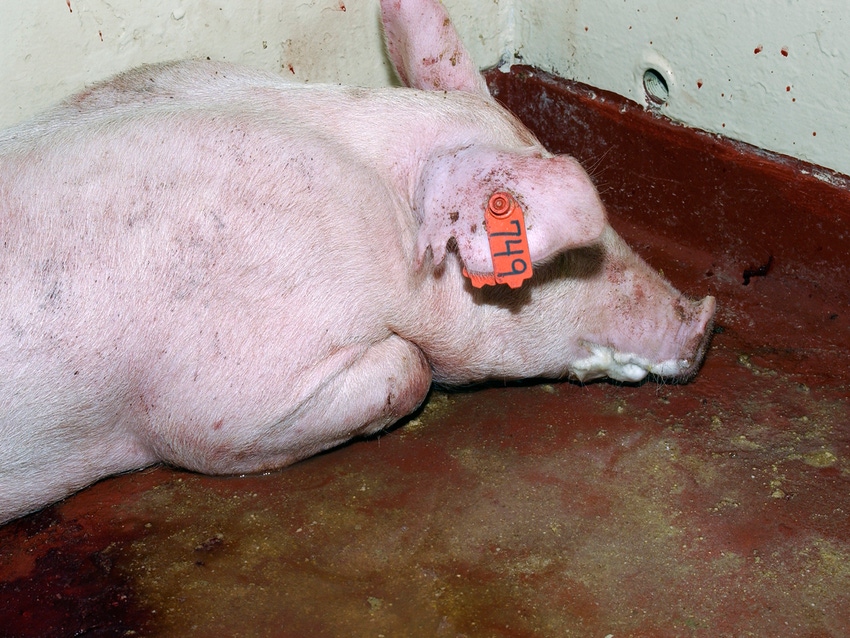Researchers will test the vaccine at USDA-ARS's Plum Island Animal Disease Center to determine if the vaccine will protect swine when exposed to a virulent
April 18, 2022

African swine fever is a highly contagious virus that causes 100% mortality in swine and for which there is no commercially available vaccine. While ASF has not yet occurred in the United States, an outbreak would cause significant economic harm and could impact food availability. The Foundation for Food & Agriculture Research awarded a $145,000 grant to Genvax Technologies to develop a self-amplifying messenger RNA (saRNA) vaccine for ASF in collaboration with the USDA-Agricultural Research Services- Plum Island Animal Disease Center. Matching funds were provided by Genvax Technologies for a total $290,000 investment in innovative ASF vaccine research.
ASF is present in many countries around the world, but to date it has never been detected in the United States. Due to its prevalence and deadly consequences in other countries, and the risk of it spreading to the United States, it is critical that we are prepared for potential future outbreaks of the virus. ASF is not a threat to human health as it cannot be transmitted from pigs to humans; however, the high mortality rates it causes in pigs would significantly disrupt U.S. pork producers and the economy.
Economic models estimate the worst-case scenario of a U.S. ASF outbreak would result in a $50 billion loss to U.S. pig producers and allied industry. Additionally, as the United States exports 20% of its annual pork production, an outbreak could affect the availability of U.S. pork on the world market, reducing access to animal protein and impacting global food security.
"We have already seen the effects of this highly contagious, deadly virus in countries across the world. If ASF reaches the U.S., we need to be prepared with an effective vaccine that can protect the U.S. swine industry," says FFAR Scientific Program Director Tim Kurt. "We have learned from the COVID pandemic that RNA vaccines can be produced rapidly and adapted for different variants; now it's time to apply those learnings to improve animal health."
Genvax Technologies is developing a non-living vaccine composed of self-amplifying messenger RNA, or saRNA. saRNA vaccines trigger the immune system to make antibodies that can successfully attack and destroy an invading virus. Researchers will test the vaccine at USDA-ARS's Plum Island Animal Disease Center to determine if the vaccine will protect swine when exposed to a virulent, or severe, strain of the virus. If successful, Gevnax Technologies will seek approval from USDA-Center for Veterinary Biologics to deploy the vaccine in the United States should an outbreak occur.
This research ensures there will be infrastructure and capacity in place to rapidly respond to an ASF outbreak with next generation saRNA vaccine technology. Additionally, the saRNA technology will be adaptable to variants of the ASF virus occurring in new outbreaks of the disease.
"The threat posed by African swine fever is extraordinary to both producers and consumers," says Joel Harris, CEO and co-founder of Genvax Technologies. "The creation, testing and regulatory approval of the vaccine will be a real joint effort by the USDA's Plum Island Animal Disease Center, the Center for Veterinary Biologics and Genvax. The goal is to get a vaccine in the field that matches 100% to the specific ASF strain if an outbreak were to occur. This vaccine will also be compatible with diagnostic tests that can differentiate infected from vaccinated animals. This makes our vaccine an important tool for eradication efforts and may alleviate any concerns with trading partners abroad."
FFAR awarded this grant through the Rapid Outcomes from Agricultural Research program, which deploys urgent funding to support research and outreach in response to emerging or unanticipated threats to the nation's food supply or agricultural systems.
Source: FFAR, which is solely responsible for the information provided, and wholly owns the information. Informa Business Media and all its subsidiaries are not responsible for any of the content contained in this information asset.
You May Also Like



